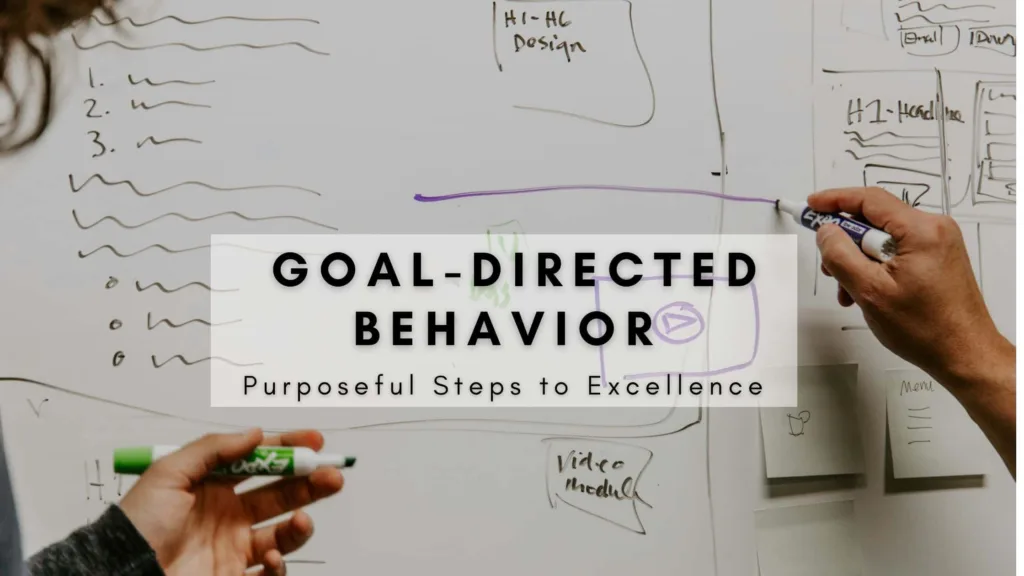Goal-directed behavior is a basic idea in psychology that describes how people take actions to reach specific goals or results. This kind of behavior involves intentional actions that are carefully planned and carried out to achieve a desired goal. Understanding goal-directed behavior is important for personal growth and success at work because it includes the factors that drive motivation, decision-making, and persistence.
Goal-Directed Behavior
Goal-directed behavior is when people do things on purpose to reach their goals. For example, a student who wants good grades will plan study times, do homework, and review notes. Someone who wants to get fit might exercise regularly, eat healthy foods, and keep track of their progress. These actions are planned and done to achieve specific goals. Understanding this helps people stay motivated, make good choices, and keep going even when it’s hard.
Theories regarding Goal-Directed Behavior
Some important ideas in psychology help explain goal-directed behavior:
- Goal-Setting Theory: This idea by Edwin Locke and Gary Latham says that setting clear and challenging goals helps people do better. Clear goals make it easier to focus, stay motivated, and make good plans.
- Self-Determination Theory: This idea was developed by Edward Deci and Richard Ryan. It talks about different types of motivation. People do better when they are motivated from within (intrinsic motivation) because it matches what they care about and enjoy.
- Expectancy Theory: This idea by Victor Vroom says people are motivated if they believe their actions will lead to good results. It’s important for people to believe they can reach their goals (self-efficacy) and to think the goal is worth it.

Parts of Goal-Directed Behavior
- Setting Goals: First, decide what you want to achieve. Goals should be clear and doable, whether they are short-term or long-term.
- Motivation: This is what keeps you going. It can come from inside you (like feeling proud) or outside (like getting a reward).
- Planning: Make a plan to reach your goal. Break it down into smaller chunks, set deadlines, and think about any problems you might face.
- Taking Action: Start doing the steps in your plan. Stay disciplined, manage your time, and focus on your tasks.
- Persistence: Keep going, even when it’s hard. Be ready to change your plan if needed and keep pushing toward your goal.
- Evaluation and Feedback: Check how you’re doing regularly. See what’s working and what isn’t. Get feedback from yourself or others to help you stay on track and adjust as needed.
Practical Uses
Goal-directed behavior can help in many parts of life:
- Personal Growth: People set goals to improve themselves, like learning a new skill, exercising, or saving money. Clear goals and plans help them achieve these improvements.
- Work Success: At work, setting goals helps people be more productive and get ahead in their careers. Companies often set goals to help employees focus on important tasks and achieve both personal and company success.
- School Success: Students set goals to do well in school, like studying regularly, finishing homework on time, and preparing for exams. This helps them stay organized and motivated.
- Health and Fitness: People set goals to stay healthy, such as losing weight, eating better, or exercising more. Clear goals and plans make it easier to stick to healthy habits and see progress.
- Better Relationships: Setting goals to spend more time with family or improve communication with friends can help strengthen relationships.
How to Get Better at it?
- Set Clear Goals: Make sure your goals are clear and doable.
- Stay Motivated: Find what keeps you excited about your goals.
- Plan Ahead: Break your goals into smaller steps and make a plan.
- Take Action: Start doing things to reach your goals.
- Keep Trying: Don’t give up, even if it gets tough.
- Get Feedback: Check how you’re doing and adjust your plan if needed.
- Stay Flexible: Be ready to change your goals or plans if things don’t go as expected.
Related Articles: Suggestibility Psychology: The Subtle Art of Persuasion
Goal-directed behavior is really important for success in life. It means knowing what you want and working towards it. By setting goals, staying motivated, planning, doing things, not giving up, and checking how you’re doing, you can reach your goals. Whether it’s getting better at something, doing well at work, learning in school, or staying healthy, goal-directed behavior helps you get there step by step. It’s like following a map to make your dreams come true and be the best you can be.
